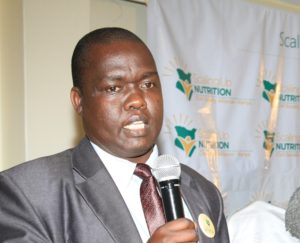Working with parliamentarians to build and sustain political commitment for nutrition
Titus Mung’ou reflects on the 23rd Series of SUN Country Network Meetings where over 300 participants from 49 SUN Countries joined to share and learn from one another on sustaining political commitment to nutrition. About the author: Titus Mung’ou is the ENN Knowledge Management Specialist…
 Titus Mung’ou reflects on the 23rd Series of SUN Country Network Meetings where over 300 participants from 49 SUN Countries joined to share and learn from one another on sustaining political commitment to nutrition.
Titus Mung’ou reflects on the 23rd Series of SUN Country Network Meetings where over 300 participants from 49 SUN Countries joined to share and learn from one another on sustaining political commitment to nutrition.
About the author: Titus Mung’ou is the ENN Knowledge Management Specialist for the East and Southern Africa region. He is a former Advocacy and Communications Manager for ACF Kenya where he was also the Chair of Kenya’s SUN Civil Society Alliance.
The teleconference whose theme was ‘SUN Building and Sustaining Political Commitment for Nutrition Action’ took place between 9-13 May 2016 and brought together 345 participants from 49 Countries and the Indian State of Maharashtra. In total, SUN Movement Secretariat team coordinated 11 teleconferences in English, French and Spanish languages, and enabled participants to discuss among others, nutrition policies, prioritization of nutrition in government structures and development, working with nutrition champions and development of advocacy strategies.
“PANITA (Partnership for Nutrition in Tanzania) has a long-term engagement with members of parliament. We undertake education around nutrition, awareness on state of nutrition in Tanzania and strategic planning to guide our relationship,” Tumaini Mikindo, the Executive Director of PANITA.
From the discussions, it was evident that a number of countries are developing their advocacy, communication and social mobilization strategies and tools to guide engagement with key stakeholders such as government officials, parliamentarians, donors and nutrition champions.
SUN civil societies in Tanzania and Zambia have made significant steps in supporting political parties to include nutrition in their manifestos in the run up to general elections. Party manifestos act as accountability documents in nutrition advocacy undertaken by CSOs. In Zambia, nutrition advocacy is done through a parliamentary caucus, inter-parties dialogue and party manifestos. To sustain engagement with parliamentarians, PANITA works with MPs to develop strategic plans every three years, which ensures nutrition remains an agenda in parliament even when new legislators join the assembly.
While the relationship between SUN actors and parliamentarians is at ad hoc basis in most countries, there are good examples of formal structures of engagement such as Tanzania’s Parliamentary Food, Nutrition Security and Children Rights Committee, Zambia’s Parliamentary Caucus on Nutrition, Ghana’s Parliamentarians United Against Hunger and Burkina Faso’s Parliamentarian Network for Nutrition. SUN civil society in Nepal works closely with two parliamentary groups to promote nutrition issues.
The participation of a member of parliament from Kyrgystan, Oskonbek Mambetzhanovich, in 23rd SUN Movement Country teleconference underscored the need to engage with legislators to advance the nutrition agenda in the country. The member of parliament explained the importance of including key politicians in delegations to nutrition conferences such as SUN Global Gathering, as they use the lessons learnt to influence other MPs to prioritise nutrition.
To bolster the role of members of parliament in nutrition, some countries are developing strategies and advocacy tools, among them Namibia’s booklet on roles and responsibilities of MPs in supporting nutrition and Kenya’s guidelines on working with parliamentarians.
“We are refining our parliamentary engagement strategy; and building capacity building of different parliamentary committees and nutrition advocates,” Marjorie Volege, UNICEF Kenya officer supporting SUN Movement.
Calls for evidence to support nutrition advocacy were made by various presenters. Most countries had completed their Cost of Hunger studies, which were cited as important tools in advocacy targeting decision-makers such as MPs and government officials.
There were scanty details on the impact of parliamentarians on nutrition in countries. However, some SUN countries credited the creation of clear nutrition budgets, enactment of policies and increase of resources for nutrition programmes to support from MPs. For example, in Burkina Faso a parliamentarian, Gnoumou Dissan, who is specialised in nutrition contacted the President to advocate for creation of a specific budget line for nutrition in the governments’ budgets. In Guinea parliamentarians are working on a BMS law, while in Nepal parliamentarians are among stakeholders spearheading the achievement of a common goal of eliminating malnutrition through nutrition sensitive and specific interventions.
Learn more about the 23rd Series of SUN Country Network Meetings ➤